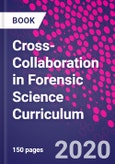Cross-Collaboration in Forensic Science Curriculum documents the best practice and experiences of a group of forensic science instructors developing complex multidisciplinary learning and teaching scenarios in higher education for forensic science. This title examines the design, development, implementation and evaluation of core scientific disciplines and includes an examination of methodologies for delivering learning and teaching for multiple evidence types using multidisciplinary teams in realistic environments that encompass specific aspects of problems and cover scenario-based learning theories. At present, no books on the market lay out best practices for those instructing in a cross-disciplinary manner within the forensic sciences.
The practical nature of the teaching techniques outlined in this guide will inform and enhance teaching across all of the forensic sciences.
- Provides best practices to those developing complex cross-disciplined learning and teaching scenarios in forensic science curriculum
- Includes a pedagogic structure designed to engage those from Crime Scene Investigation, Forensic Science, Forensic Biology and Digital Forensics
- Offers an examination of methodologies that leads to a blueprint for implementing cross-disciplinary teaching within forensic science
Table of Contents
1. Skillsets2. Challenges
3. Construction and Planning
4. Delivery
5. Evidence Types
6. Blueprint Development
7. Student Perceptions
8. Lessons Learned
9. Pedagogical Evaluation
Authors
Horsman, Graeme Dr. Graeme Horsman is a lecturer in computer and digital forensics at Teesside University and has over 6+ years of experience in teaching in higher education. Graeme worked as a digital forensic analyst and was previously an EnCase Certified Examiner and Computer Certified Examiner (EnCE) and Certified Computer Examiner (CCE). He has a BSc (Hons) in Computer Forensics, a PhD, Graduate Diploma in Law, Masters' of Jurisprudence (Durham) and Post-Graduate Certificate in Higher Education Practice.His research focuses on digital forensic examination techniques, methods for forensically investigating mobile devices, and knowledge-based systems for improving digital forensic examinations and evidence identification. In addition, Graeme is research active in the area of testing and validation in digital forensics and learning and teaching methods. Sub-research topics include the use of so-called anonymous communication services and the potential detection of users and legislation surrounding the possession, distribution and creation of illegal imagery








